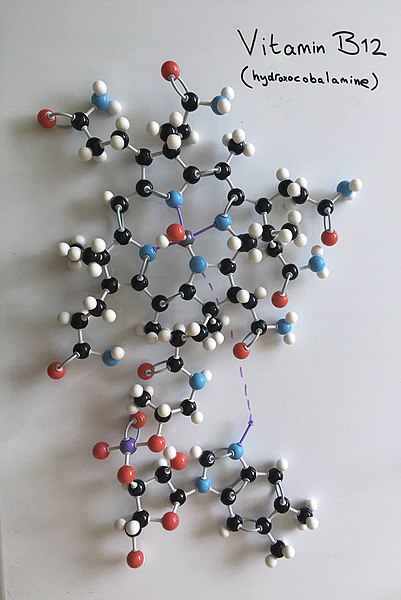
Molecular model of Vitamin B12. Licensed under CCO 4.0, courtesy of Wikimedia Commons.
Three years ago, I biked into a curb and fell on my head. When I got up, I couldn’t remember where I was, so I called an ambulance, which drove me to the nearest hospital, which was apparently one block away. The emergency room doctors told me there was nothing they could do. My eye was swollen, but my face seemed otherwise normal, and they wouldn’t know if anything was wrong with my brain unless they ran a CAT scan, which would expose me to toxic radiation. I asked if there were any nontoxic tests they could run for free. They offered to run a blood panel, which would let me know if I had any STIs. I let them bind my forearm, which had nothing to do with my head.
The next day, the doctor sent a message through the hospital’s online portal. My tests were all came back negative, but they had also run a nutrient panel, and I was deficient in B12. I started googling. “Fell off bike low B12?” Everything that came up was random; I might as well have strung together any other combination of five words. I wanted to google more, but the doctor had told me that the internet was bad for my concussion. So I forgot about my deficiency and tried hard to make my body do nothing, which was the only way for it to heal.
Things got better. I started to feel normal, and eventually I was allowed to google as much as I wanted. Years went by. And then one day at a café, I met a man—a comedian—who told me horror stories about his life as a former vegan. His hair had fallen out, he was exhausted, his mood was always sour, and it was all because of vitamins: he could never get enough of them. While he complained, I felt my hairline receding; I was a vegan, too. And when I thought about it, really thought about it, my personality was on the decline. I was always struggling to make my days have meaning, and I wore my meaninglessness like a divine premonition. (“I have a feeling,” I texted a friend, “that something bad, really bad, is going to happen.”) I remembered the emergency room doctor’s diagnosis and felt the empty place inside of me where all the B12 supplements should have been, leeching into my bloodstream.
I tried to make a doctor’s appointment, but I had moved to California, and my insurance only covered care in New York. My body was on the West Coast, but all the tools I had for reading it were on the East. I told my father I was coming home to visit him, and when I arrived, asked him to drop me off at urgent care.
“Sorry,” said the receptionist. “The only blood work we do is for STIs. Nutrition panels aren’t urgent.”
I called my primary care physician’s office and told them that I had a need, a pressing need, for a B12 test. Everything I was feeling—daily bouts of idiocy, a persistent feeling of doom—was perfectly summarized by the deficiency symptoms I found online: headaches, psychological problems, palpitations, dementia. The receptionist told me that a nurse practitioner would be able to draw blood the next day—not soon enough. I requested a personal day from work and went to CVS, where I bought a bottle of supplements labeled “maximum strength.” Each pill contained 5,000 mcg of B12, which is 208,000 percent times the recommended daily value. They weren’t even vegan, but I took a double dose, hoping it would tide me over until my appointment, after which I was sure the doctor would put me on an emergency course of injections.
My brain was becoming an abacus. It was almost impossible to feel my feelings without translating them into the language of diagnosis, which was laughably general and yet strangely precise: symptoms claimed to contain the spectrum of human experience, but reduced that experience to a dozen ugly words. The vitamins themselves could counteract those ugly words because they contained good words of their own. Happiness, energy, valiance, relaxation: swallowing them daily felt like ingesting a little promise, saying a little prayer. How else could I communicate with my body besides putting speech inside it?
Anyway, my appointment came and went. No one called to give me my results, and when I checked the online portal, I noticed that my doctor, who hadn’t even seen me directly, who was in the habit of using the euphemisms “number one” and “number two,” had left me a message. “Hi mya—everything is looking great : ) No need for a follow-up at this time.” I checked the numbers. My B12 levels had surpassed the minimum threshold; they had even surpassed the desirable range. The pills had worked, and they had worked too well. The data, my data, had been contaminated: the language on the screen had nothing to do with what was happening in my body. And yet the doctor depended upon that language to approach my body, even though my body had been in front of her, trying to announce its problems.
I wanted the numbers to go down. Once they went down, I could prove to my doctor that they needed desperately to go back up. And so, I stopped taking the supplements, and the B12 slowly left me, detaching itself from my vocabulary until it became an abstract problem, a nonurgent problem, a random string of letters and numbers whose meaning was obscure to me, and which was no longer a metaphor for happiness.
Maya Binyam is a contributing editor of the Review. Her novel, Hangman, will be published by Farrar, Straus and Giroux in August.
from The Paris Review https://ift.tt/BRxC4ov
Comments
Post a Comment